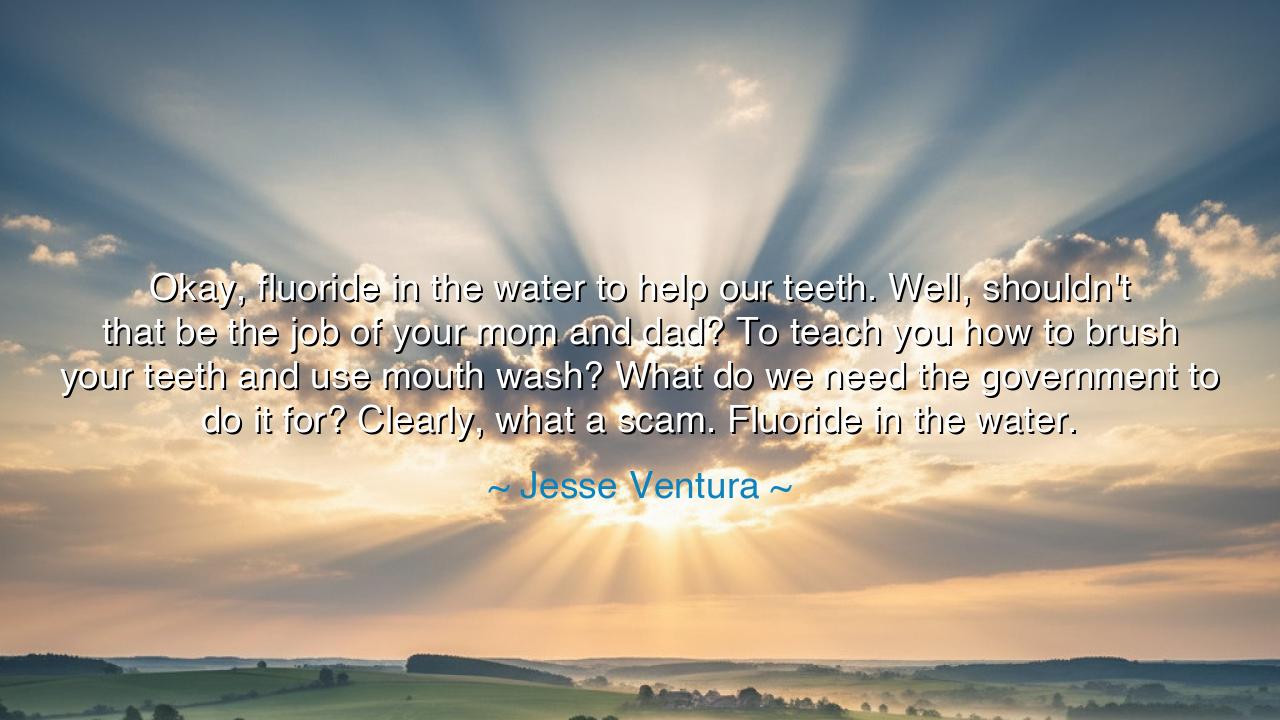
Okay, fluoride in the water to help our teeth. Well, shouldn't
Okay, fluoride in the water to help our teeth. Well, shouldn't that be the job of your mom and dad? To teach you how to brush your teeth and use mouth wash? What do we need the government to do it for? Clearly, what a scam. Fluoride in the water.






When Jesse Ventura exclaimed, “Okay, fluoride in the water to help our teeth. Well, shouldn’t that be the job of your mom and dad? To teach you how to brush your teeth and use mouthwash? What do we need the government to do it for? Clearly, what a scam. Fluoride in the water,” he spoke with the raw defiance of a man who distrusts unnecessary control. His words, though fiery and laced with skepticism, reflect an ancient struggle — the tension between individual responsibility and institutional power. Beneath the sarcasm lies a deeper question: who bears the duty of care — the parent, or the state? Ventura’s voice carries the spirit of the rebel philosopher, asking not about fluoride alone, but about freedom itself — the right to self-govern in a world increasingly managed by invisible hands.
In the tradition of the ancients, this question is not new. Long before governments poured chemicals into public water, the thinkers of old warned that every gift of authority carries a shadow. Plato, in his Republic, pondered the balance between wise governance and tyranny; Lao Tzu, in the Tao Te Ching, cautioned that “the more rules there are, the poorer the people become.” Ventura’s statement, in its rough and modern form, echoes these truths. He is not merely speaking of fluoride; he is asking whether the state’s intrusion into the most personal corners of life — even one’s drinking water — represents progress or peril. It is the eternal question of how much we are willing to surrender for comfort, and how much we must protect to remain free.
The origin of the quote lies in Ventura’s years as both a governor and a cultural icon — a man who lived at the crossroads of power and rebellion. Known for his unfiltered speech, he gave voice to a uniquely American distrust of government overreach. His critique of fluoride, though literal in form, becomes symbolic in essence. It challenges us to ask: when the state decides for us, do we grow stronger or weaker? Should the parent teach hygiene, or should the government decide what enters every home through its pipes? In that question lies the larger moral of Ventura’s philosophy — that responsibility is sacred, and the moment we yield it entirely to authority, we lose a measure of our humanity.
Consider, too, the story of Prometheus, who stole fire from the gods to give it to humankind. The fire was knowledge, the power of self-sufficiency. Yet with every gift, there comes danger — for when power is given, it can also be taken back. Ventura’s warning about “fluoride in the water” can be seen through this mythic lens: that convenience, when accepted blindly, may dull the very independence that defines the human spirit. If the gods of bureaucracy decide what is best for our health, our food, our thought — what then remains of the fire Prometheus gave us? What happens to the individual will?
Yet, Ventura’s voice is not that of nihilism or paranoia, but of accountability. He does not cry for chaos but for awareness — for people to remember their own agency. The “mom and dad” in his statement symbolize the primary teachers of wisdom, the family as the first school of virtue and health. His lament is that society, in its dependence on institutions, forgets the sacred role of the home. It is the duty of each generation to guard its children, not to delegate that sacred trust to unseen administrators. The fluoride, in this metaphor, becomes the symbol of a larger decay — the slow erosion of personal duty beneath the flood of systemic management.
From this reflection, we may draw a timeless lesson: freedom demands participation. A people that forgets how to govern itself invites others to govern it. To rely upon institutions for every need — from education to morality, from health to happiness — is to weaken the muscle of the soul. Ventura’s critique, wrapped in satire, is a call to reclaim the strength of personal responsibility, to remember that wisdom begins not in laws but in the home, in the heart, in the daily acts of care between parent and child. The greatest civilizations fell not from external invasion but from internal dependence — when citizens ceased to think, to question, to act.
So, my listener, take heed of this lesson: question not to destroy, but to awaken. Let your first government be your conscience, your first law be reason, your first ruler be love. Drink from the well of wisdom before you drink from the wells of convenience. For as Jesse Ventura reminds us, the power to shape the future lies not in the hands of systems or rulers, but in the small, steadfast acts of those who choose to live awake. Be vigilant. Be responsible. And above all, guard your freedom as you would guard your child — for once surrendered, it is seldom returned.






AAdministratorAdministrator
Welcome, honored guests. Please leave a comment, we will respond soon